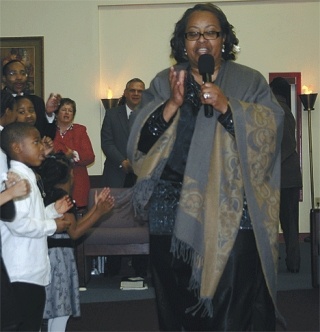The floor shook. Hands clapped. Eyes looked to the sky. In harmony, voices belted “Oh Happy Day” during Sunday’s celebration of national unity and the vision of one very great man.
Leaders of the Unity Fellowship in Oak Harbor, described Martin Luther King, Jr.’s dreams of equality and peace as a prelude to the inauguration of President Barack Obama.
“What a glorious time to be alive, to see this change,” Darice Johnson said. “My mother said she never thought she’d live long enough to see a black president.”
The mostly African-American congregation honored Martin Luther King, Jr. Day with a two-hour service including sermons, songs, dancing and speeches.
Having served in the Navy for 24 years, Minister Tony Brown reflected on the racial progress of the U.S. military. During World War II, African-American sailors were often limited to menial duties and until 1944 they could not be promoted to officer status.
However, the look at past adversity was juxtaposed with a need to look ahead.
“It is 2009 and we need to turn the page,” Brown said.
While God was central to Sunday’s sermon, King and Obama were given high praise.
Musician Tony Reed played a song on the ukulele that he had written after Obama’s victory over Sen. John McCain.
“On November 1, I was in Hawaii driving a $30 rent-a-wreck and was fiddling with the radio to hear who was winning the election. McCain was talking and I thought ‘Oh no!’ but then I realized I was hearing his concession speech. I was so overjoyed, I pulled the car over and began writing a song,” Reed said.
The audience chanted his chorus, “Change is here, the dream is with us.”
In honor of King, a worshipper sang one of the reverend’s favorite songs, “If I Can Help Somebody.”
For his second year at the church, Mayor Jim Slowik shared stories of Dr. King to the packed house. He noted King’s 2,500 speeches and his title of “Man of the Year” by Time Magazine in 1964.
“In 1963, King directed a peaceful march, the March on Washington with 250,000 people. I was watching it on TV with my parents,” he said. “It was big news and it was change.”
He followed with a quote from King’s “Strength of Love” sermon in 1963: “The ultimate measure of a man is not where he stands in moments of comfort and convenience, but where he stands at the time of challenge and controversy.”
Oak Harbor High School graduate Darice Johnson, the evening’s keynote speaker, currently teaches at Seattle’s African American Academy and Rainier Scholars in Seattle.
She recalled early voting in Renton, which had her standing in line for three hours. Johnson used the time to think about voting in the larger context.
“As I was standing in line, I thought, ‘Why do we vote?’ We vote because of the fight and struggle of those who came before us,” Johnson said.
Johnson has visited Africa three times, and urged the audience to make a concerted effort to learn their history, from the kings and queens of Zulu to the early origins of Christianity in Ethiopia.
“It is not accurate that we started off as slaves. You come from great civilizations in Africa,” she said.
Johnson’s speech also carried a theme of “passing the torch,” from King to Obama and from community members to the next generation, to equip them socially and academically.
The legacy of Martin Luther King, Jr., she said, is that he forced Americans to look in the mirror at the double standards by which they lived. He, like countless other African Americans, made sacrifices because of his faith in the future.
Before the choir erupted into the final song, Johnson channeled Barack Obama’s “Yes we can” campaign slogan.
“In the name of our ancestors, never giving up hope, yes they did. In the name of today, yes we can. And in the name of the future and those who will carry on our legacy, yes we will.”



